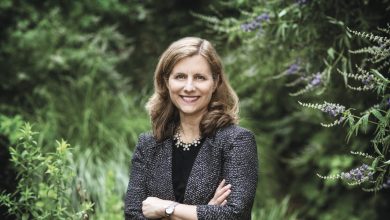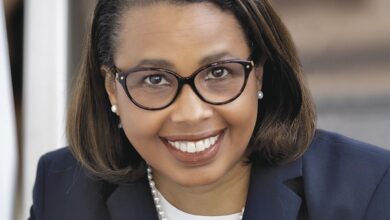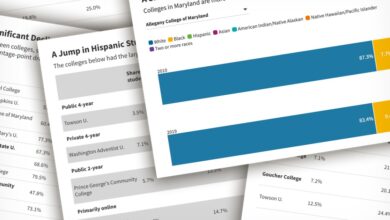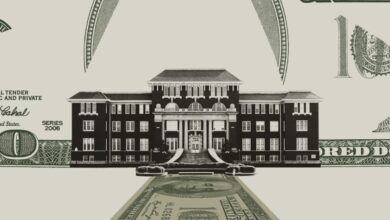Higher Ed Reacts to Ben Sasse at U. of Florida
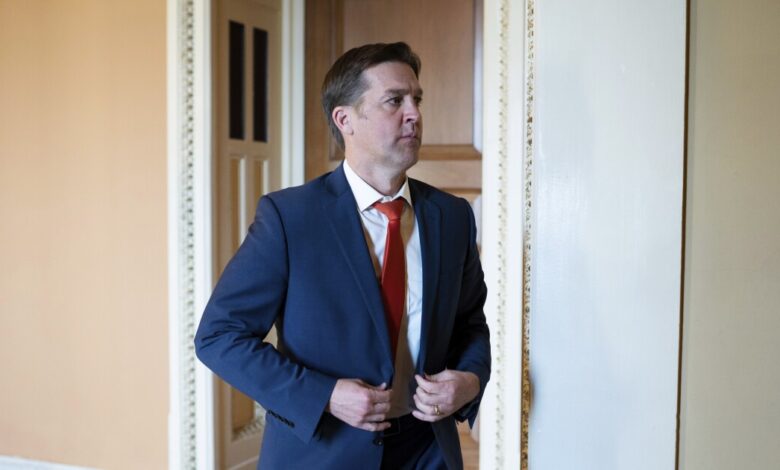
The University of Florida’s announcement of Sen. Benjamin E. Sasse as the sole finalist for its presidency elicited reactions that spanned from sunny faculty quotes in a news release to downright alarm about the direction of an embattled university. Sasse, a second-term Nebraska Republican, would take the job at a crucial moment for the state flagship, which has in recent months been plagued by academic-freedom concerns.
Amanda J. Phalin, chair of the university’s Faculty Senate, praised Sasse’s selection on Twitter, writing: “This is a historic moment that calls for a unique, transformational leader, & that is who I think our search committee has found.” (Phalin declined further comment in an email to The Chronicle but added that she’ll deliver remarks at a Faculty Senate meeting on Monday afternoon where Sasse will also take questions.)
Also singing Sasse’s praises were several faculty members who served on the presidential search committee, quotes from whom were included in the university’s Thursday statement. UF’s Board of Trustees will vote on the committee’s recommendation of Sasse at a meeting scheduled for November 1.
Others have been less enthusiastic about Sasse, citing his opposition to gay marriage and abortion.
Even a member of Sasse’s doctoral dissertation committee at Yale University chimed in. The Bulwark, a center-right conservative news site, described Sasse as having “a keen sense of history and constitutional principles.” Glenda Gilmore, a professor emeritus of history at Yale, tweeted: “As a member of his dissertation committee, ‘keen’ is not the word that comes to mind.”
Several campus organizations — including the statewide United Faculty of Florida, the staff and adjunct faculty union, the graduate-student union, and the campus chapters of College Democrats and the Young Democratic Socialists of America — are planning a protest on Monday outside the building where Sasse will hold several public forums, The Independent Florida Alligator reported.
Along with Sasse’s stances on gay marriage and his conservative politics, Emilio M. Bruna, a professor who holds dual appointments in UF’s department of wildlife ecology and conservation and its Center for Latin American Studies, is also concerned about Sasse’s past skepticism on the impacts of climate change. The stakes feel especially high, Bruna said, given that the institution has recently seen national controversy after officials attempted to curtail faculty members’ outside activities.
“The faculty feel like what they really need is someone who’s got their back and wants to put them in a position to do what we know we can, or we want to do, as opposed to feeling like we’re on defense, trying to just hunker down and defend ourselves,” Bruna said.
Bruna said he’ll reserve judgment until hearing Sasse speak on Monday. “But I will be really, really worried if I don’t hear a full-throated defense of academic freedom and tenure.”
A Shrouded Selection
“It’s very shocking that, of 700 people, there weren’t two qualified candidates that we could have brought to the university so that we could at least have choice,” Kroger said.
The process from which Sasse emerged was more secretive than past presidential searches at the university. A state law signed in March allows public colleges to keep secret the names of candidates who applied for the job. More than 700 leaders were contacted about the position, and “a dozen highly qualified diverse candidates,” including nine sitting presidents at major research universities, were identified, the Tampa Bay Times reported.
“It’s such an outstanding research university that even given the challenges with the political environment, there would be lots of people who would be interested in that job,” said H. Holden Thorp, former chancellor of the University of North Carolina at Chapel Hill and editor-in-chief of Science.
Because of the closed-door nature of Florida’s search process, Sasse will have to contend with assumptions that his selection was politically motivated, Bruna said. “If he’d been one of three finalists in the past, and we knew who those finalists were and then he were selected, it’d be one thing. But this maybe makes it a little more difficult for him because it gives this appearance of being a political choice, even if it’s not the case,” he said. (Rahul Patel, the university trustee who served as chair of the search committee, told The Gainesville Sun that politics played no role in Sasse’s selection.)
If appointed, Sasse would join several prominent politicians who have recently become Florida university leaders. Sen. Ray Rodrigues, a Republican of Florida, was recently appointed chancellor of the State University System of Florida. John Thrasher followed a similar path, having been a Republican state senator when he was named president of Florida State University in 2014. Thrasher’s advice to Sasse is to “leave the politics on the front steps,” Thrasher told the USA Today Network – Florida. “Deal with what’s in the best interest of the university and the students.”
Elsewhere, Mitchell E. Daniels, a former governor of Indiana, has spent nearly 10 years at the helm of Purdue University, where he will retire at the end of the year. Daniels, another Republican heavyweight, could prove an example for Sasse to emulate, Thorp said.
“Mitch Daniels ended up being able to serve at Purdue for a good, long time. He had a lot of political support. That’s also an excellent research university,” Thorp said. “I think Senator Sasse would be wise to look him up, but I bet you he already has.”
Sasse’s Credentials
Sasse earned his Ph.D. in history from Yale University in 2004 and briefly taught history as an assistant professor at the University of Texas at Austin. He also held several positions in the George W. Bush administration.
Prior to his election to the U.S. Senate, in 2014, Sasse was for five years president of Midland University, a private Lutheran institution in his native Nebraska. He was lauded there for raising enrollment numbers, a boost that came partially because of the closure of nearby Dana College. (Dana, a rural private institution, shut its doors in 2010, the same year Sasse took over at Midland.)
Sasse also replaced a traditional tenure system with performance-based “term tenure.” He told a Nebraska news outlet in 2013: “We raised a bunch of money and bought a lot of professors out.”
Sasse’s decision to run for U.S. Senate while still in office as a college president was unusual. Midland’s board chair at the time stressed repeatedly that Sasse’s views did not reflect the college’s. Sasse, for his part, returned much of his presidential salary because he wasn’t working on campus full time.
Some have questioned whether Sasse’s experience at Midland qualifies him to lead one of the country’s biggest research institutions. Each of Florida’s last three leaders have come to the Sunshine State with prior research-university experience, which Sasse lacks. W. Kent Fuchs was provost at Cornell University; Bernie Machen was president of the University of Utah; and Charles E. Young spent nearly three decades as chancellor of the University of California at Los Angeles.
Sasse’s lack of familiarity with the research world could make it difficult for him to manage Florida’s billion-dollar research portfolio, Thorp said.
“They really need somebody who understands how to operate a research university, contracts and grants, building buildings, the lobbying for indirect costs, startup packages,” Thorp said. “They also, more importantly, need someone who has the passion and experience to explain why research is important in a state like Florida. It’s always true that state legislators struggle with what research is all about, and if the primary person who’s going to talk to them about that isn’t a researcher, then that creates a big problem.”
Sasse will need to surround himself with strong academic leaders at Florida and “be willing to go to the mat when they do things that the political folks object to,” Thorp said. “I’d say that’s an open question given the political environment in Florida.”
Rethinking Higher Ed
That environment includes Gov. Ron DeSantis, a Republican, who shares Sasse’s political leanings and has taken a keen interest in the operations of the state’s public colleges.
“As a successful former university president, national leader and deep thinker on education policy, Ben Sasse has the qualifications and would be a good candidate,” DeSantis’s office said in a statement. DeSantis, as governor, has no role in the selection process, but Politico reported that DeSantis’s chief of staff served as Sasse’s “sherpa” in the selection process.
DeSantis has taken on faculty teaching, accreditation, and intellectual diversity. He even devised a sweeping plan to fundamentally reshape how colleges make decisions, concentrating more authority in the university system’s politically appointed Board of Governors, though that vision hasn’t yet come to fruition. One DeSantis proposal would have given the board the power to hire faculty, stripping that power from the president.
Sasse, meanwhile, wrote a recent essay in The Atlantic full of talking points that are familiar in college-leader and think-tank circles: criticism of highly rejective elite colleges and degree programs that don’t pay off, as well as praise for the unique missions of both the liberal arts and job training, and for “adaptive learning” that meets students where they are.
Sasse also took a more political stance by flatly deriding the idea of student-loan forgiveness, saying it would mostly benefit rich people. (Biden’s debt-forgiveness plan, released after Sasse’s piece published, has an income cap.)
Sasse’s essay is “spot on about some things,” Bruna, the Florida professor, said. “We are kind of stodgy about the way we think about education, and student debt is a crushing burden that needs to be dealt with and which legislatures, state, national aren’t dealing with.” The Atlantic piece “read a little bit like a slide deck in Silicon Valley,” he added. “It’s super tech-heavy and jargony, but at the same time, he’s identified some really interesting challenges and problems.”
Some of the suggestions Sasse makes in the essay include eliminating the credit hour — which he describes as a “relic of the industrial economy of the early 20th century” that reveals “little about what students have learned or how much they’ve grown, only how long butts have been in classroom seats” — and embracing corporate certification programs, which he says are “more economical and more secure for some students than a traditional diploma.” How much big-picture change would Sasse be able to affect at a sprawling institution like Florida?
Bruna, the Florida professor, said he’s not sure what to expect going forward.
“It could have been worse,” Bruna said. “That’s not the mandate you might hope for as a new university president. But it may be the starting point from which we work.”


